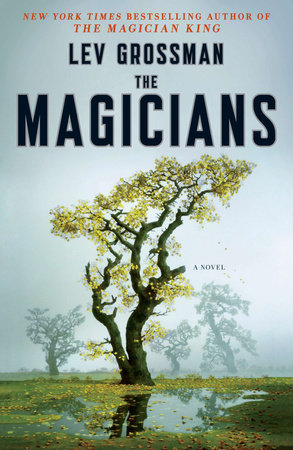“Quentin did a magic trick. Nobody noticed.”
At the start of Lev Grossman’s brilliant Harry-Potter-on-a-bender novel THE MAGICIANS, you’ve got to pity poor Quentin Coldwater. The academically gifted teenager is trapped in a cycle of self-loathing and romantic frustration, which wins him only pity from best friends James and Julia. (Of course Quentin’s in love with Julia. Of course Julia is in love with James, who naturellement returns her affection with gusto.) What’s a depressed Brooklyn geek to do? Why, submerge himself in his favorite books, a series of children’s novels set in Fillory, a Narnia-esque land populated by all the fantasy tropes you can pull out of a magician’s hat. Oh, and learn a few sleight-of-hand card tricks.
Quentin’s resigned himself to being always miserably on the outside. But then things change. An admissions interview for Princeton transforms into a peculiar entrance exam for Brakebills, a secret college of magic populated with other teen outliers like Quentin. There’s Alice, whose advanced supernatural talents distract from a dark family loss; bon vivant Eliot, who submerges himself in alcohol—but only of the finest vintage—to obliterate his unresolved Oregon roots; manipulative Janet, who can’t help but introduce a soupçon of sexual mayhem everywhere she turns. Their scholastic progression through Brakebills is recounted in a series of picaresque set pieces that cumulates in one of my favorite monologues I’ve ever read:
What is it that makes you magicians? . . . Is it because you are special? Maybe. Who knows? But I’ll tell you something: I think you’re magicians because you’re unhappy. A magician is strong because he feels pain. He feels the difference between what the world is and what he could make of it. . . . But you, my friends, you have found another way: a way to use your pain. To burn it as fuel, for light and warmth. You have learned to break the world that has tried to break you. (p. 217)
Though I first read THE MAGICIANS because of the television series, I quickly realized the novel is a whole other beast. (No pun intended for those familiar with either novel or series.) I’m convinced THE MAGICIANS is really a parable about navigating the world when you’re a young, wounded creative who hasn’t quite found your footing yet. Grossman excels at depicting the solipsistic mindset of emo teenagers and just-out-of-college twentysomethings; that sense of “nobody understands me and I am so alone.” Parents are barely mentioned except as background incidentals akin to the blah blah blah hum of adults in a Charlie Brown cartoon. Professors appear on an “as needed” basis to spur the action along. Your favorite childhood novel is as real as you need it to be for your own maturation.
THE MAGICIANS is a book I really wish I’d read when I was a too-sensitive-for-this-world teen. While I don’t think it would have spared me the misery of those years, it might have offered hope of a place for me in the world—even if wasn’t Brakebills.
Ultimately, in THE MAGICIANS, the greatest quest isn’t to rule Fillory. It’s to rule your own unruly life.








